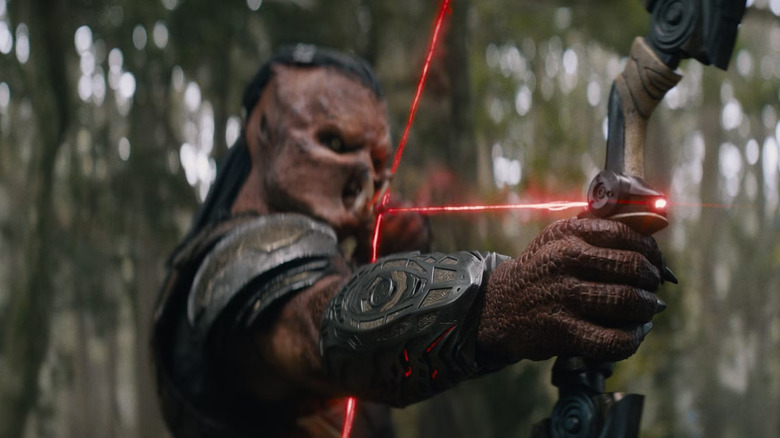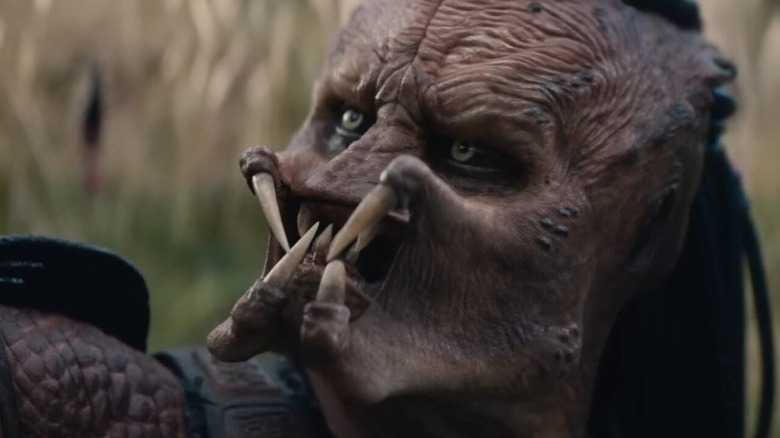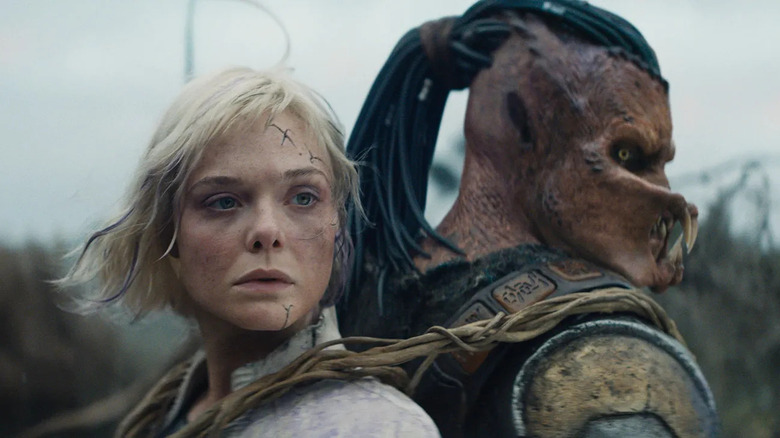Predator: Badlands Proves That Fighting Your Dad Is Good, Actually
This article contains spoilers for "Predator: Badlands."
The first "Predator" film moonlights as a straightforward action film stuffed to the gills with muscles, mud, and machine guns. But beyond the explosions lurks a sharp political and cultural critique. Released amid the fallout of the Iran-Contra affair, "Predator" reflects a shifting American consciousness, and the film's distrust of institutions is a direct product of Reagan-era disillusionment. Authority cannot be trusted, those who are loyal to it are expendable, and the CIA has no problem cooking up a story to drop men in a meat grinder. When Dutch (Arnold Schwarzenegger) realizes that he and his men have been manipulated, his righteous anger rings hollow because it cannot undo the slaughter of the faceless "mountain boys," struck down by the corrupted belief that violence is honorable when killing "the enemy."
But who determines who is the enemy?
The Yautja hunt by their own moral code, one that exists in opposition to the elite paramilitary rescue team, but both of these sides justify their killings through their own codes of honor. And therein lies the hypocrisy of masculine heroism. The same ethical justification Dutch uses to excuse his own violence is the same mindset that the Yautja uses to pick off his men. Yautja cull their weak, and essentially represent the Patriarchy incarnate, so when the final showdown sees Dutch and the Predator facing off in hand-to-hand combat, Dutch recognizes that his hulking muscles alone cannot take him down. Instead, he must use his wits and his environment. And even then, the Yautja would rather self-destruct than admit defeat. The message is clear: systems of dominance, whether governmental or gendered, would rather annihilate everything than yield power.
And "Predator: Badlands" is here to encourage us to put an end to these cycles of toxic thinking at the source — it's time to fight our dads.
Even the Yautja have horrible dads in Predator: Badlands
"Predator: Badlands," the third film in the franchise to be directed by Dan Trachtenberg, following "Prey" and "Predator: Killer of Killers," is, as /Film's Jeremy Mathai wrote in his review, "the most radical 'Predator' film since the original." Instead of identifying with any humans attempting to defeat the Yautja (or the Yautja and the Xenomorphs), "Badlands" brings us into the world of Dek (Dimitrius Schuster-Koloamatangi). He's the "runt" of his family, so his father wants him dead to preserve the strength and supremacy of the clan. After his brother Kwei (Michael Homik) is killed by their father for refusing to kill Dek, he is sent to the death planet, Genna, to bring home a trophy and prove his value. It's a coming-of-age adventure story about a young would-be Predator, where the character growth is as vital as the exploding of alien creatures with orange goo for blood.
Dek's father, Njohrr (also played by Schuster-Koloamatangi), is no different from the oppressive hardasses often seen in teen movies. He spews harmful ideology that makes Dek feel like grieving his own brother is a sign of weakness that he must push down, and keeps him chasing the dream of finally living up to the Yautja's unattainable ideals. His father's influence and his species' culture of machismo and bravado have turned Dek into a ticking time bomb, the same kind we saw in the young man of Netflix's "Adolescence," that are bound to explode without intervention. Dek believes that maybe, just maybe, if he can kill the unkillable Kalisk and earn his cloak (the invisibility cloak used throughout the franchise), his father will finally respect him.
But anyone who has dealt with someone like Njohrr knows that masculinity thrives on the arrival fallacy.
The benefits of cutting off terrible family members (or letting your homie bite their heads off)
Dek arrives on Genna with one goal: kill or be killed. He insists on surviving alone, even after Thia (Elle Fanning), a damaged Weyland-Yutani synthetic, and Bud (Rohinal Nayaran), an endearing creature, save him more than once. He fights their assistance at every turn, but the further he's away from the influence of his father and his home planet, the more enlightened he becomes. Thia tells him about Earth's "wolves," pack animals led not by the fiercest killer but by the one who protects the group. The revelation reframes Dek's notion of strength; power isn't isolation or dominance, but service to others. It's a sharp rebuke to the "alpha" ideology peddled by manosphere grifters who glorify hyper-individualism while exploiting the lonely.
Returning home, Dek's father predictably sneers at his trophy. There's no reasoning with, reprogramming, or convincing him to think outside of his poisonous patriarchal creed that worth equals conquest, so, like many breaking free from generational cycles of harm, Dek severs ties. Although in the Yautja culture, that means a duel to the death. Dek, like Dutch before him, is smaller but smarter and uses wit and instinct over brute force. His father would have preferred to self-destruct to preserve pride, but Dek denies him that final control. With Bud's help, the loyal creature ultimately bites off Njohrr's head. Dek's transformation completes the parable: real masculine strength lies not in domination, but in choosing to protect, heal, and unlearn the destructive belief systems of prior generations. The story's moral lands with primal force; if you live like a cancer within your community, you will be healed or removed, because isolation masquerading as strength is the truest weakness of all.
Sometimes you have to fight your dad to be free of tyranny and forge your own path.
"Predator: Badlands" is in theaters everywhere.


